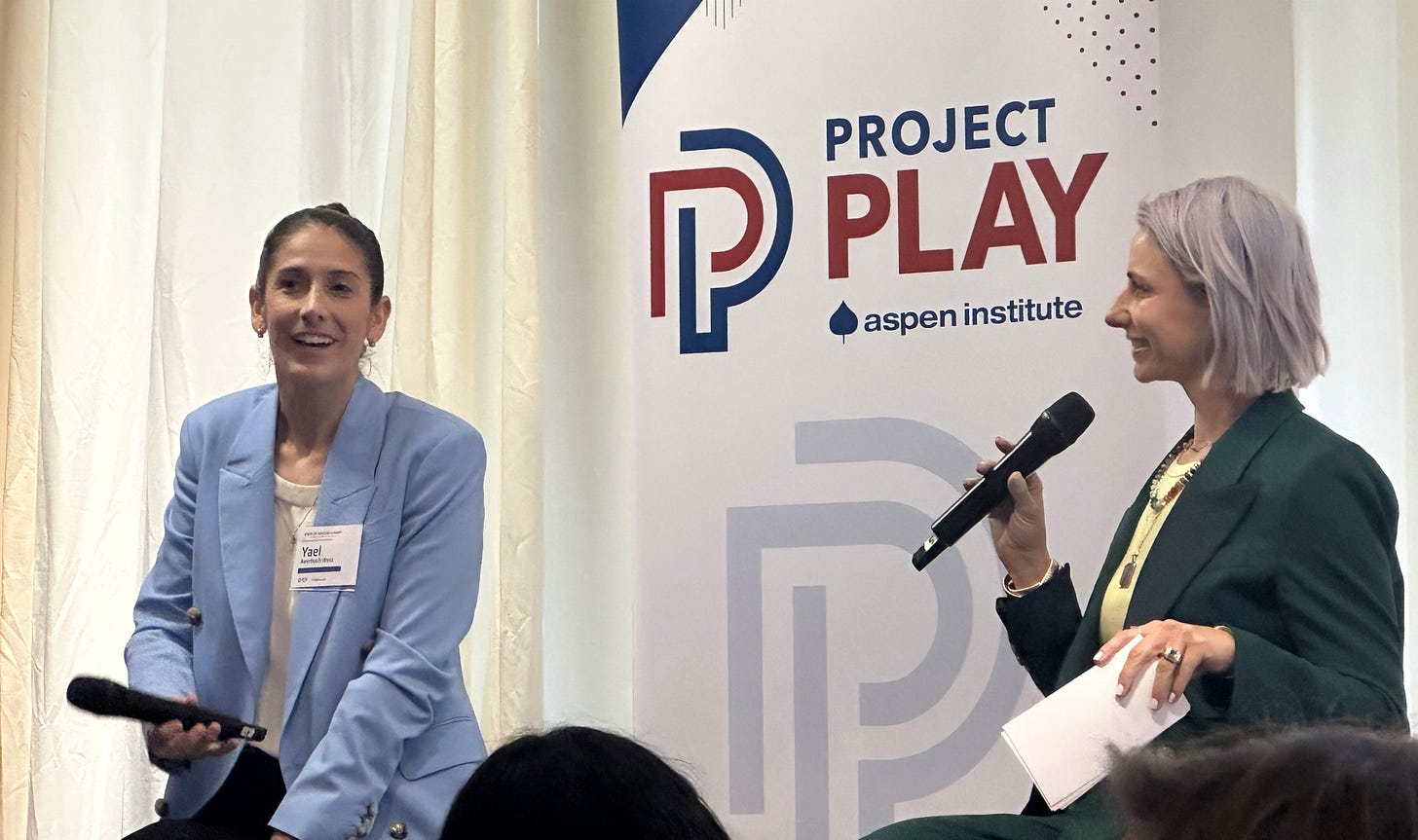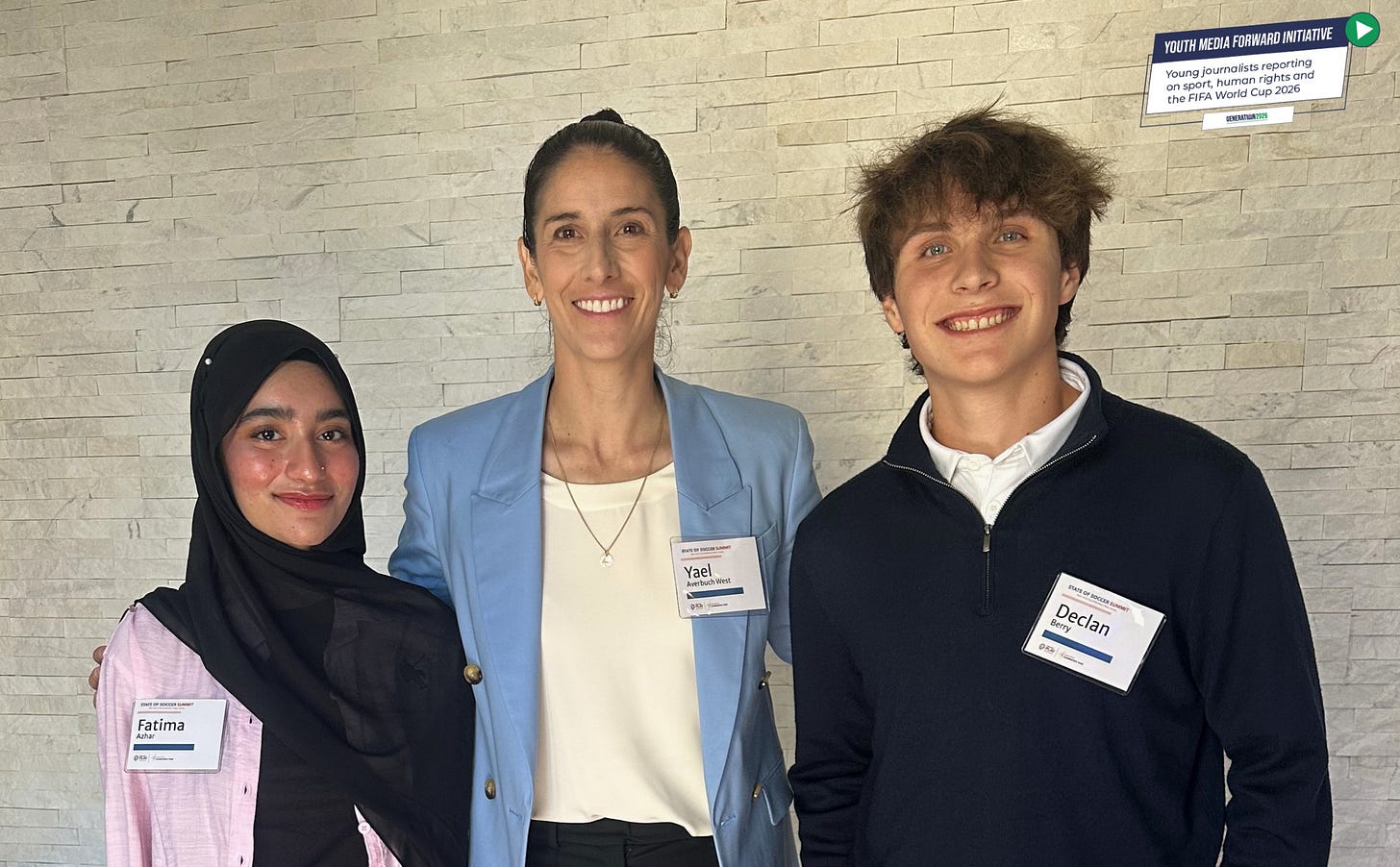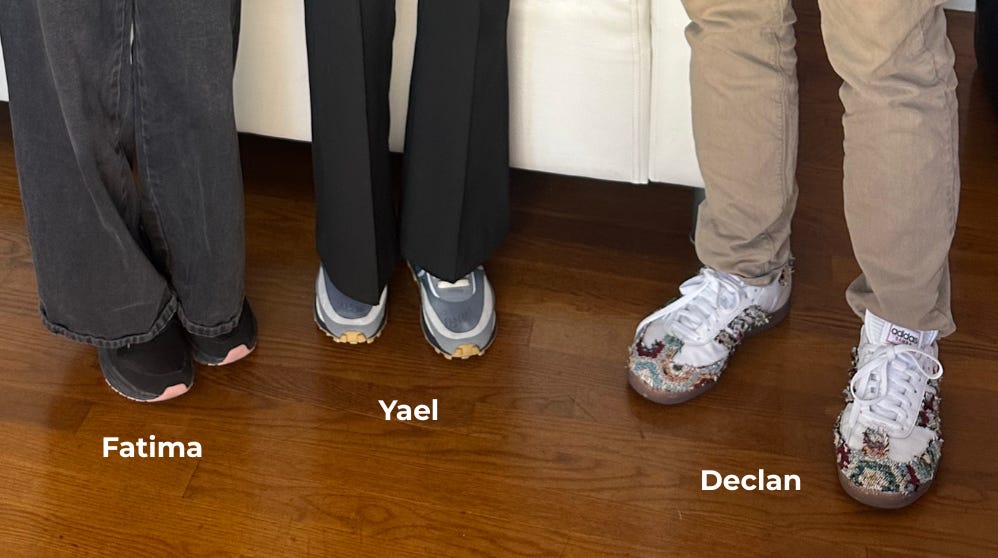In conversation with Yael Averbuch West, General Manager of Gotham FC
Interview - Fatima & Declan, New Jersey
New Jersey-based Youth Media Forward reporters Declan and Fatima interviewed Yael Averbuch West on the sidelines of a “State of Soccer Summit” hosted by Aspen Institute’s Project Play. Yael is a former professional soccer player, and is currently the General Manager of Gotham FC which competes in the US National Women’s Soccer League (NWSL).
Their conversation covered leading and inspiring others in the women’s game, the role of high-profile clubs in strengthening the links between the grassroots and professional games, and…sneakers!
Here’s their conversation.
Fatima: As someone who can be seen as a role model for women, what values do you want to portray to encourage other players and leaders like you?
Yael: Strength and confidence are things that are visibly apparent when you watch Gotham FC play. I think those are really important.
Also I think there is a big body image conversation. What does it look like to be a successful woman? If you just say those words, what would someone imagine? Maybe something from a magazine with a very thin model. But our women are powerful. There’s all different body types that can succeed, they are the best in the world at what they do.
We had a rookie this year score an own goal in her first game with the team. And then she went on to fight, and play and slide, and her jersey was all grassy and dirty…That’s an amazing image for someone to see of a successful woman.
“There’s a lot that we’re still learning about how women need to train and play the sport in the most healthy and safe way while also maximizing the ability to compete and win”.
Declan: You mentioned Gotham FC is deepening its outreach to local girls’ teams. What is the role that big organizations can play in helping to shift the system - strengthening the connections between the grassroots and professional games?
There is a cumulative effect. It’s what we’re trying to do [for example through the Gotham FC initiative “Keep her in the Game”]. More than 1700 girls were part of our programming during the first year. We are an influential body in this, but we also need to work with the State associations, with groups that are here at the event today, to create this larger current.
For the larger organizations like us, first and foremost it’s stating the purpose. I think that can’t be understated to say how important it is for us to be doing this.
Then you need to develop real programming that has an impact. That costs money, and takes thought and planning - to set up the program, pay the people to lead it and run the operational side. We have just scratched the surface of what other people can follow.
Fatima: I read that you have had to overcome a health condition [ulcerative colitis]. So I was wondering, as a manager of a women’s team, how are you able to balance your players’ health with their determination to play and their strength?
Yael: That’s a wonderful question. You know, we have a wonderful staff that supports our players’ health and performance - and those two things are very closely linked.
There is health like not getting injured and not being ill. There is also health that leads to optimal performance. We’re asking them to do something at the 1% in the world of what they do. So how can they not just be healthy, but be their very best, be getting stronger and faster, and their recovery be optimized between training sessions?
It’s actually very complex. We support with a lot of data, we do a lot of testing, even strength testing throughout the season to check if they are at risk for injury. And an area of women’s soccer that’s still relatively untapped and that we are trying to be on the frontier of is women-specific health related to the menstrual cycle. Do you need different nutrition or supplements during that time? Should you be training differently? These are things that are under-researched because most of the people researching have been men.
And they apply to young girls too. Girls playing at a more recreational level still have the same type of challenges as women competing at the highest level. And then it’s heightened when you’re being asked to push your body really hard.
There’s a lot that we’re still learning about how women need to train and play the sport in the most healthy and safe way while also maximizing the ability to compete and win.

Declan: During this event you mentioned a lot about recreational and scholastic programs as an alternative to pay-to-play. Do you think that making changes in soccer can in turn benefit other sports like basketball, football and others?
Yael: I think some other sports are a little ahead of soccer in that sense. There’s a lot of basketball being played that you don’t have to pay for. You can even see visually if you go through a neighborhood - people playing pickup basketball is a great example. For [American] football you need pads and you can’t really go play football on a street corner - so it’s a bit sports specific in terms of what you need to participate.
But in general, it’s either you just play for fun at school and in rec, or you are really an athlete and you play in a more serious environment. For soccer [that difference] is currently very extreme. I don’t think those things need to be so mutually exclusive - it should be a continuation.
Sports would benefit from a merging of all those concepts, and an extension of the recreational and free and school-based programming.
“The idea of becoming elite should be available to anyone who wants to work hard in any given field. If there is a barrier where someone needs a certain amount of resourcing, a certain family upbringing or support, or has to come from a certain type of background to become elite, then something’s broken in the way the term is being used”.
Fatima: There’s something that I see in my community and see a lot of conversations about - which is how it’s difficult to avoid desiring elitism, especially if you’re from a less privileged background. You may see it as your way out. How do you think that people like local leaders, coaches and managers could play a role in shifting that desire for elitism?
Yael: I think when we use the word elite or elitism, it depends on how you define it. The idea of trying to become elite when it means the best version of that field is a really healthy and good model. Like the idea that you could practice something locally and maybe in your mind, you know, a way out is to become a professional, to get a college scholarship, to go on doing that sport - I think is really good and important. It provides hope, it provides a reason why you would continue to participate, it provides competition.
The way that elite is used right now I think is actually the problem. Elite can be a title slapped onto a soccer program to indicate expensive, and that is where I think it’s really dangerous and disused - when it is not available to everyone. The idea of becoming elite should be available to anyone who wants to work hard in any given field.
If there is a barrier where someone needs a certain amount of resourcing, a certain family upbringing or support, or has to come from a certain type of background to become elite, then something’s broken in the way the term is being used. And I think that’s true in soccer [in the US].
I think we need to really look at how that word is used and maybe actually come up with different terminology. Even if we just call it paid programming, or travel soccer - that’s pretty accurate. You have to all-of-a-sudden travel, it doesn’t mean you’re better, it just means you’re deciding that your family can travel.
If we more accurately define things as to what they actually are, I don’t think elite would be used in the same way at all.
“I think when it comes to social relationships and confidence there is so much
that soccer can bring”.
Declan: What do you see as the social role of sports, particularly soccer, for personal development outside of being competitive?
I think when it comes to social relationships and confidence there is so much that soccer can bring. I think it does require competing at soccer to get those things. You bond with your team when you’re trying to play against another team, or you enjoy practice because you’re trying to learn a new skill and maybe you fail a couple times and then you get better.
I would also cite the idea of connecting with people from different backgrounds. Soccer is a common language. I’ve played soccer with people and actually feel like I know them well, even if I’ve not had a conversation with them because we can’t speak the same language. We bonded and had an identification through, for example, we like to play the game a certain way.
So there’s such a social landscape, both individual social growth and skills, and also community and team. But it does require continued participation. It requires people wanting to show up and do those things, which also has to be supported by the coaches and the larger infrastructure that’s set in place.
Fatima: Ok, so we were all asked to wear sneakers today! Can you tell me about yours?
Yael: Well I don’t know sneakers very well, my husband is really into them. But wait a minute, forget mine, what about yours! Those are really cool, where did you find those?
Declan: They were an anniversary present from my girlfriend.
Yael: Good job girlfriend!
Fatima: And mine - my sister said that they’re sporty, so would be good to wear today!
Yael: I’ve loved this conversation - thank you!
This interview was conducted during Aspen Institute Project Play’s “State of Soccer Summit: New York City and Northern New Jersey”, which brought together people passionate about expanding access to and improving experiences of the game as the region prepares to host the 2026 World Cup.
Related: The Centre for Sport and Human Rights, Aspen Institute’s Project Play, UNICEF USA, the US Soccer Foundation and the National League of Cities have formed the Child Rights & Sports Alliance to advance the rights of children and youth in the planning, execution and legacy building for the FIFA World Cup 2026.





